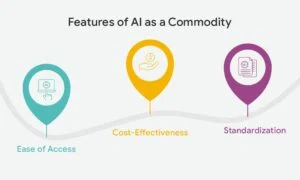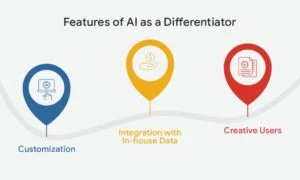Artificial intelligence is no longer science fiction. It is now everywhere and is transforming the way companies do business. One of the most popular innovations in artificial intelligence is generative AI models, which can generate text, images, music, and even code.
But as these AI models grow well, one crucial question occurs: Are they becoming common commodities, or are they still capable of making companies stand out? Let’s check this and decide what the future of generative AI holds.
The Rise of Generative AI
Not long ago, generative AI was a groundbreaking innovation. Tools like ChatGPT, Midjourney, and DALL-E amazed people with their ability to generate human-like content. Businesses quickly realize their potential for automating tasks, enhancing creativity, and improving customer interactions.
However, as more companies started adopting these models, technology became more accessible. Small businesses can now use generative AI easily and affordably thanks to open-source frameworks and cloud-based services. This raises a critical question: if everyone has it, does it still give a competitive edge?
The Commoditization Argument: AI for Everyone
Some experts argue that generative AI is following the path of other technologies, like cloud computing or data analytics, that started as differentiators but eventually became standard tools.
- Ease of Access: Platforms like OpenAI, Google’s Gemini, and Meta’s Llama offer ready-to-use models. There is no need to build AI from scratch for business. They can just plug in and play.
- Cost-Effectiveness: As competition grows, AI services are becoming more affordable. Now small players can access what was once exclusive to tech giants.
- Standardization: Most AI models do the same thing. If two firms implement the same base model, they look for how much variation in outputs they can possibly have?
If the trend keeps up, generative AI could be a normal utility like electricity, in which having it is the norm, but it doesn’t necessarily make you great.
The Differentiation Argument: Special AI for Special Needs
Many people are convinced that generative AI models still have a large scope for differentiation if they are applied correctly. Here’s why:
- Customization: Organizations can tune AI models to cater to their individual requirements. A fashion house’s AI can create designs influenced by its own style, whereas a law firm’s AI can prepare case-related documents.
- Integration with In-house Data: Businesses with deep datasets can train AI to provide insights that competitors cannot. Consider healthcare companies using patient information to create designed treatment plans.
- Creative Users: Certain businesses exceed standard AI applications. For instance, video game studios use generative AI to design dynamic narratives that shift depending on player decisions, a value proposition that can differentiate them from reality.
In such cases, AI acts as a fundamental aspect of the business model.
The Middle Ground: It Depends on How You Use It
The main truth is probably somewhere in the middle. Companies are increasingly using generative AI models, but their role depends on how businesses use them.
For some, AI is a productivity help that assists in drafting emails, composing social media updates, or streamlining customer support. In these instances, it is more of a commodity.
For others, AI is revolutionary, driving new products, personalized experiences, or even new business models. Here, it’s a differentiator.
Commodity vs. Differentiator
| Aspect | Commodity | Differentiator |
| Ease of Access | Widely available through platforms like OpenAI, Google’s Gemini, and Meta’s Llama | Customized and tailored to specific needs |
| Cost-Effectiveness | Affordable due to increased competition and accessibility | Requires investment in customization and integration with in-house data |
| Standardization | Most models perform similar functions, leading to uniform outputs | Unique applications and creative uses provide distinct advantages |
| Customization | Limited customization, often using off-the-shelf solutions | Highly customizable to meet specific organizational requirements |
| Integration with Data | Basic integration with general data sources | Deep integrations with proprietary datasets for unique insights and solutions |
| Innovation | Used for routine tasks and basic automation | Drives new products, personalized experiences, and innovative business models |
| Competitive Edge | Common utility, similar to electricity, providing basic functionality | Acts as a core aspect of the business model, offering significant differentiation |
| Examples | Automating emails, social media updates, and customer support | Creating dynamic narratives in video games, personalized treatment plans in healthcare |
The Future: Where Do We Go from Here?
As AI continues to advance, companies need to determine how to use it and adopt AI generative models that are actually beneficial. Consider the following points:
Don’t Just Follow the Crowd: Depending on AI simply because ‘everybody else is’ won’t work. Find out where it can be used to address actual problems or produce original value.
Invest in Customization: Off-the-shelf AI solutions might not be enough in the long term. Customizing models for your business will keep you ahead.
Emphasize Ethics and Trust: With the widespread use of AI, consumers will be more concerned about how it is applied. Transparency and proper AI practices can be a differentiation point in themselves.
Final Thoughts: Commodity or Differentiator? The Choice is Yours.
Generative AI models are powerful, but their role depends on how businesses use them. They can be everyday tools that automate routine tasks, or they can be the magic ingredient that makes a brand irreplaceable. Business leaders who view AI as just another tool might go unnoticed. But those who do something new and innovative with it can still achieve an actual advantage.
So, what is your approach, a commodity or a differentiator? The choice might determine your future success.
For more information, visit YourTechDiet!
FAQs
1. Is generative AI becoming too common to be useful for businesses?
Answer: Not necessarily. Although generic AI tools are common, companies that innovate and design with generative AI can still differentiate between them. It’s about applications.
2. Can small companies compete with large corporations using AI?
Answer: Yes! Several inexpensive and user-friendly AI tools allow small companies to automate and optimize efficiency. The key is targeting specialized uses that suit them.
3. Will AI ever be able to replace human creativity at work?
Answer: No, AI can offer ideas and content, but human creativity, strategy, and emotional intelligence cannot be replaced. The best outcomes result from mixing both.
Recommended For You:
Exploring the Implications of Generative AI natural language processing for Marketers
What Are Some Ethical Considerations When Using Generative AI?



